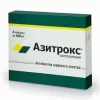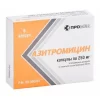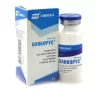Description
Imipenem and Cilastatin Pharmacodynamics
Imipenem is a beta-lactam broad-spectrum antibiotic, is a derivative of thienamycin and belongs to the group of carbapenems. It inhibits the synthesis of the bacterial cell wall and has a bactericidal effect against a wide range of Gram-positive and Gram-negative. aerobic and anaerobic microorganisms. Cilastatin sodium inhibits dehydropeptidase, an enzyme that metabolizes imipenem in the kidneys, which significantly increases the concentration of unchanged imipenem in the urinary tract. Cilastatin has no intrinsic antibacterial activity and does not inhibit beta-lactamase bacteria.
Imipenem+cilastatin is resistant to degradation by bacterial beta-lactamases, which makes it effective against most beta-lactam-producing microorganisms such as Pseudomonas aeruginosa, Serratia spp. and Enterobacler spp. resistant to penicillins and cephalosporins.
Imipenem+cilastatin has a bactericidal effect in vivo on the following microorganisms:
Gram-positive aerobic bacteria: Enterococcus faecalis, Staphylococcus aureus (including penicillinase-producing strains), Slaphylococcus epidermidis (including penicillinase-producing strains). Streptococcus agalactiae, Streptococcus pneumoniae, Streptococcus pyogenes;
Gram-negative aerobic bacteria: Acinetobacter spp., Citrobacter spp., Enterobacter spp., Escherichia coli, Gardnerella vaginalis, Haemophilus influenzae, Haemophilus parainfluenzae, Klebsiella spp, Morganella morganii, Proteus vulgaris, Proteus rettgeri, Pseudomonas aeruginosa, Serratia spp. including Serratia marcescens;
Gram-positive anaerobic bacteria: Bifidobacterium spp., Clostridium spp., Eubacterium spp., Peptococcus spp., Peptostreptococcus spp., Propionibacterium spp.
Gram-negative anaerobic bacteria: Bacleroides spp. including Basteroides fragilis, Fusobacterium spp.
Imipenem has a bactericidal effect in vitro on the following microorganisms:
Gram-positive aerobic bacteria: Bacillus spp., Listeria monocytogenes, Nocardia spp., Staphylococcus saprophyticus, Streptococcus groups C, G and group viridans;
Gram-negative aerobic bacteria: Aeromonas hydrophila, Alcaligenes spp., Capnocytophaga spp., Haemophilus ducreyi, Neisseria gonorrhoeae, including strains producing penicillinase, Pasteurella spp., Providencia stuartii; Gram-negative anaerobic bacteria: Prevotella bivia, Prevotella disiens, Prevotella melaninogenica, Veillonella spp.
Insensitive: Enterococcus faecium, methicillin-resistant Staphylococcus spp., Xanthomonas maltophilia, Pseudomonas cepacia.
In vitro it acts synergistically with aminoglycosides against some strains of Pseudomonas aeruginosa.
Indications
Infectious and inflammatory diseases caused by microorganisms sensitive to the drug:
– lower respiratory tract infections;
– urinary tract infections;
– intra-abdominal infections;
– gynecologic infections;
– bacterial septicemia;
– Bone and joint infections;
– Skin and soft tissue infections;
– bacterial endocarditis.
Prevention of postoperative infectious complications
Contraindications
– Hypersensitivity to one of the components of the drug, as well as to other carbapenems, beta-lactam antibiotics, penicillins and cephalosporins;
– chronic renal insufficiency with CKR less than 5 ml/min/1.73 m2 without hemodialysis;
– early childhood (up to 3 months);
– in children – severe renal failure (serum creatinine concentration more than 2 mg/dL).
Dosage and administration method
- Intravenous drip.
- The drug formulation for intravenous administration should not be administered intramuscularly.
- Average therapeutic dose for adults with body weight greater than or equal to 70 kg and normal renal function (CK 70 ml/min/1.73 m2 or more) is 1-2 g/day (per imipenem) divided into 3-4 injections.
- The maximum daily dose is 4 g or 50 mg/kg, whichever is lower.
- Depending on the severity of the infection, the following doses are recommended (imipenem dose calculation):
– For mild infections and uncomplicated urinary tract infections, 250 mg 4 times daily (total daily dose 1 g);
– In a moderate course – 500 mg 3 times a day or 1000 mg 2 times a day (a total daily dose of 1.5-2 g);
– in severe course and complicated urinary tract infections – 500 mg 4 times daily (total daily dose 2 g);
– In patients with life-threatening infections – 1000 mg 3-4 times a day (total daily dose 3-4 g). - For prophylaxis of postoperative infections this dose is 1000 mg during anesthesia and 1000 mg after 3 hours. In case of a surgical intervention with high risk of infection (colorectal surgery) 500 mg is administered additionally 8 and 16 hours after general anesthesia.
- For patients with CKD less than 70 ml/min/1.73 m2 and/or body weight less than 70 kg the dose should be proportionally reduced (imipenem dosage calculation)





![Imipenem+Cilastatin powder for infusions 500 mg + 500 mg - [1 vial]](https://mediscom.com.co/wp-content/uploads/2022/11/Imipenem-and-Cilastatin-500mg500mg-1.webp)




